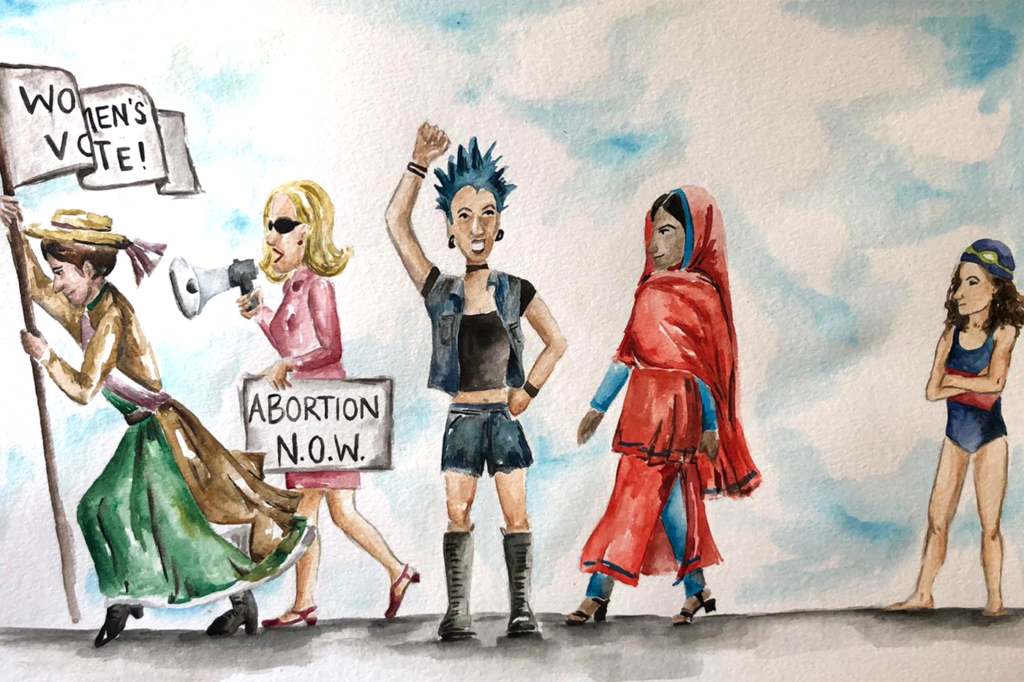Is Mona Charen a Feminist
Ana: You’ve had quite a career, starting off in your twenties writing for National Review. You then joined the White House staff of First Lady Nancy Reagan as a speechwriter and later the staff of President Ronald Reagan. Next, you finished law school but returned to journalism, resulting in your own syndicated column for top journals. You raised three sons, one of them adopted, wrote three books, two of which became New York Times bestselling books, have appeared on many TV and radio shows and podcasts and have earned numerous prizes. While you were accomplishing all of that, did you consider yourself a feminist?
Mona: Thank you, Ana. I did not see myself as a feminist, really ever. And that was because from a young age I started reading a lot of the critiques of feminism, and reading the feminists as well. And I was put off, though I was pro-woman and I wanted what was best for women. I was put off by the tone of aggrievement, of hostility toward men, of a sense of “we’re going to join the long list of victims in the world.” I also resisted the authoritarian tone of the feminist movement, the notion that you have to watch your language. You’re not allowed to say that. My favorite joke in college was the one about “How many feminists does it take to change a light bulb?” The answer: That’s. Not. Funny. Their screechy and hostile tone just put me off.
But look, there’s no doubt that there is some good in the feminist message. There really is. The message that women need to be more forceful, that they shouldn’t take a back seat, that they shouldn’t assume that men have something more worthy to say and they’ll wait until the men have said it before raising their hands. There’s some truth in that. To the degree that feminists encourage women to be forceful and take leadership positions and all of that, I’m for that. There were certainly things, and I talk about this in my book Sex Matters, that feminism did for our society and culture that were good changes. But I think many of them were very, very bad. And I go into that too. But some of them were good, and I want to be fair.
Start your day with Public Discourse
Sign up and get our daily essays sent straight to your inbox.The message that women need to be more forceful, that they shouldn’t take a back seat, that they shouldn’t assume that men have something more worthy to say and they’ll wait until the men have said it before raising their hands. There’s some truth in that.
First-Wave Feminism and Its Heirs
Ana: I’d like to ask you some questions inspired by the waves of feminism. Let’s begin with the 1800s activists, the women we refer to today as “first-wave” feminists, women like Mary Wollstonecraft, Elizabeth Stanton, Susan B. Anthony, and the suffragettes. These were bold, Christian women who banded together to abolish slavery, to enact prohibition, and to work for the passage of the Nineteenth Amendment. You explain that they were not just focused on women’s rights, but spoke out on behalf of many vulnerable members of society, including men and children. Are there any currents of feminism in America today that you believe embody that original spirit? Are there any rightful heirs to the first wave?
Mona: There isn’t any specifically feminist organization or movement that is dedicated to advancing the same kind of principles that the original suffragists were. However, there are many who call themselves feminists and who are pursuing great things in this world. Recently I profiled a group called the Juvenile Law Center in Philadelphia. It’s a group of women and men who advocate for youth in the child welfare and justice systems. Because of the 1994 crime bill, in many states, a child—say an eight-year-old—can be placed on a sex offender registry list for an offense that sometimes is really just childish foolishness. They are kept on that registry for the rest of their lives with staggering consequences. These are the kinds of injustices that I think the original suffragettes would have taken the lead in confronting. And it’s the kind of work that has bipartisan appeal.
I also have to say that one of the groups that is maintaining the tradition of the suffragettes is a group that most of our opinion leaders would not want to count as moral leaders. I consider the pro-life movement to be in that category. They have maintained the focus on speaking for those who are weak and vulnerable and who cannot speak for themselves.
Second-Wave Feminism and Its Marxism
Ana: You helpfully describe the 1960s second-wave feminists as Marxists with an asterisk. Germaine Greer, Shulamith Firestone, and Kate Millett all embraced Marx’s vision of the class struggle, but they threw sex into the mix. So, the oppressor class became the patriarchy, and the victim class became women. Today, we hear this same class-struggle language deployed in the service of new sexual minorities, such as transgender minorities. When this framework is in play, those of us who question a belief held by the “victim class” are automatically treated as “oppressors.” This shuts down freedom of speech and inquiry very effectively, and it certainly feels manipulative to anyone who has ever been on the “questioner” side of the equation. Do you have any advice for those of us who wish to get around this framework? How can we help to heal our culture of these polarizing patterns of speech and thought?
Mona: This is a very delicate matter. I think you can go a long, long way by acknowledging straight up when you discuss these issues that you don’t have any ill will toward anyone, that you sympathize with people, that you want people to be happy but that you’re skeptical about the science and you’re skeptical about this sudden discovery of this whole new class of people. There seems to be an element of fashion in this.
I think it’s unhelpful to treat this as war. It isn’t helpful to call people names or to disrespect them in any way. For example, I think people who see themselves as transgender are struggling; they are not happy; they are dealing with something that they don’t understand, but that doesn’t mean that they don’t deserve respect and sensitivity and all of that.
As a journalist, for example, I struggled with what to do about using male or female pronouns for people who have decided they want to be called something else. Do you say, “No, you’re a man so I’m going to use ‘he,’” or do you just say, “you know what, if that’s what you want to be, I’ll go along with it”? My solution, which maybe isn’t all that satisfactory, was if it’s an adult, someone over the age of 18 and they say they’ve changed and they want to be identified as something else, then I will identify them the way they would prefer. When it comes to children, though, I don’t. Because I think that changing children’s gender—you can’t—but treating them as if they are a member of the opposite sex is child abuse. And I don’t want to be a party to it, and I don’t think it deserves respect. And so when it comes to the kids, that’s the line I draw.
Ana: So basically, your answer is kindness. That’s what I’m sort of hearing from you. When people are Marxist and mean, try to respond in kindness. Be as conciliatory as possible. Is it that simple?
Mona: Not with everybody. There are limits. I think those who are struggling with gender identity issues deserve compassion. But when it comes to ideologues who are eager to upend nature and society, kindness is not necessary or even helpful. And I believe that we need to be quite forceful in resisting the current rage for transgenderism in children. It’s dangerous and based on nothing but ideology.
I think those who are struggling with gender identity issues deserve compassion. But when it comes to ideologues who are eager to upend nature and society, kindness is not necessary or even helpful.
Second-Wave Feminism and Abortion
Ana: Let’s turn to abortion. Second-wave feminists championed “reproductive rights,” particularly birth control and abortion, as keys to women’s liberation. Additionally, they showed a spiteful temper toward pregnancy, childbirth and stay-at-home motherhood, showing some very different colors from first-wavers in these respects. You write about the feminists’ justifications for abortion, especially the “my body, my choice” argument, as hard to swallow. Would you comment on that here?
Mona: Sure. When I was first considering the question of abortion in college, I didn’t have any set views. I didn’t grow up in a particularly religious household, and we didn’t talk about it around the kitchen table. When I got to college, I took a course in the philosophy of law. Abortion was one of the issues that we had to look into. At the time, my moral intuition was that to end the life of a child in the ninth month of pregnancy was a horror. But to do it in the first month of pregnancy didn’t seem so bad. I just had to find that point in the pregnancy when it changed from being okay to being not okay. So, I started to look for that point, but . . . well, that point is impossible to find. The only non-arbitrary point is the point of conception, the moment when we have a brand new being with its own full set of genes. That embryo is tiny, but it is a unique individual with its own body.
Time and again, the argument we hear from the feminists is: women’s bodies are supreme, and women have to have complete autonomy about what happens in their bodies. In the end, however, the only answer to that is it’s not just one body. It’s just not. It’s two bodies. Why should only the woman’s body count? What about the baby’s? This signals a major inconsistency in feminism. Feminism is dedicated to defending one class of people’s rights (women) at the expense of another whole class of people’s rights (the unborn).
Planned Parenthood’s logic seems to be that human dignity and membership in the human family depend entirely upon the feelings of the mother. If the child is wanted, doctors will go to great lengths to save even very tiny babies in the womb. If the child is unwanted, professionals will go to great lengths to kill it. For them, therefore, human life begins whenever the mother wants it to begin. But that is not an objective, viable argument for when life begins. That’s an ideology.
I think something deeper is going on here. The kind of mental work required to believe faulty ideas like these spawns a kind of mental rigidity. This rigidity clings to an idea as if it were sacrosanct, in spite of all reasonable refutation. This rigidity makes abortion sacred, the alpha and omega of women’s rights, and it causes people to shut down their moral imaginations in the process. This is the only thing that can explain the chilling callousness of those who withhold life-saving care from a child who survives an abortion, effectively being in favor of post-birth abortion.
Third-Wave Feminism and International Women’s Rights
Ana: Third-wave feminism stresses the importance of intersectionality. I understand this to mean a couple of things: first, listening to feminists outside of our western bubbles, and second, paying attention to the many ways that people can be unjustly discriminated against, not only based on sex or gender, but also on race, socio-economic class, religious or political views, and so forth. When I apply that lens, I see brave women outside the United States who have taken on the mantle of feminism to fight for basic human rights: for instance, Nobel Laureate Malala Yousafzai from Pakistan, who fights for the right to education for girls; Chimamanda Ngozi Adichie from Nigeria, who advocates gender equality in Africa; or Lydia Cacho from Mexico, who exposes frightening rings of sexual violence against women and children in her country. These women are fighting for basic civil liberties that we have long taken for granted in the United States. Are these women more like first-wave feminists trapped in modern twenty-first-century patriarchies? How can we reach out to support them?
Mona: Right. On the one hand, we want to support them in their fight to live in safety, to have access to equal opportunities, and to be free from unjust discrimination. On the other hand, I want to warn them about feminism. I want to say, the packaging sure looks great on that product labeled “feminism,” but you may want to look very carefully at the list of ingredients. My sense is that these kinds of things are penetrating other parts of the world at different rates. So, there’s tremendous pushback in certain traditional cultures against some of the things feminism endorses, such as the sexual revolution. Hopefully, they will be able to learn from our American experience and pick and choose a little bit more wisely. I think we can support them by encouraging them to keep speaking out, and to think for themselves and not feel like they have to cave to mainstream American feminists’ pre-packaged sets of values.
I want to remain hopeful that feminists in other countries can incorporate the good elements of feminism while avoiding the bad. However, Chimamanda Ngozi Adichie and Lydia Cacho are both pro-abortion, so I would not say these women are modern day first-wave feminists. These women are indeed fighting for some basic issues that the first-wavers fought for, but they are also taking up a number of the issues that second- and third-wave feminists stand for, so it’s complicated. Hopefully there are other pro-life feminists on the international scene who can avoid the darker sides of feminism and uphold the worthy aspects of it.
Fourth-Wave Feminism and the #MeToo movement
Ana: There is debate over whether there is such a thing as a fourth wave of feminism, but if it exists it thrives online, with the Me Too movement being its debut. I’m wondering if you have seen positive fruits of the Me Too movement. Many people criticized it, saying it went too far with the message of “toxic masculinity,” or complaining that it offered no clear solutions to the enormous problems it uncovered. Have you seen signs of course correction since Me Too?
Mona: I greeted the Me Too movement with enthusiasm, but I interpret it in a way that is not quite mainstream. The people involved may not perceive it this way, but it is a backlash against the sexual revolution and against the sexual mores that we’ve adopted in our society. This is women themselves saying, “Enough. Get your hands off me,” and standing up for themselves. And so I am for it, foursquare for it.
Have I seen positive fruits? I was on the Bill Maher show. After, at the end, he always does a photo with all of his guests. And actually, he’s not exactly a role model of the perfect gentleman. We must put that on the table. I happen to like him, and he’s funny, but you know. Anyway, as we were all standing together for the photo, he put his hands on my shoulders for the photo, and he said, “I only do shoulders. They’re not going to get me.”
I’ve talked about this on a number of campuses debating feminists about what the movement can be interpreted as. They always say, “No, no, that’s not it.” But those are the professional feminists. The students are more open to the idea that it is a backlash.
I should just add, though, that there are people on the extremes who are just crazy and who interpret anything from a man, even asking someone out on a date in a perfectly legitimate way, as a form of sexual harassment. So, you really have to be careful about how you define your terms and that you don’t become hysterical about normal romantic interactions.
Feminism and the Future
Ana: Allow me to borrow your distinction between professional feminists and ordinary women, particularly the women raising families (whom I identify with most closely). My perception is that a lot of us moms consider ourselves to be feminists of a certain (non-academic) sort. I see lots of moms trying to raise successful girls, who can be the next Olympian swimmers or future CEOs, but who are also servant-hearted and cultivating their maternal instincts. Moms out there who are trying to raise smart girls with grit, but who also volunteer in soup kitchens and care for the marginalized; girls who treasure their sexual modesty and know how to defend their personal boundaries, but who also delight and charm the opposite sex with a light-hearted joie de vivre. In short, girls who are profoundly pro-life, pro-woman, pro-children, and pro-men. Do you think there is room in feminism for these up-and-coming girls?
Mona: Wow. What a beautiful statement. I endorse it wholeheartedly. One of the unfortunate poisons that feminism leached into the culture is hostility between the sexes. We need to rescue feminism from that. We need to stress the importance of raising boys and girls who are open-hearted, respectful, and comfortable with themselves and each other. We need to raise boys with healthy models of masculinity that stress self-control, and girls who, well, who have all the traits you just listed. Women and men need each other, and children need parents. The sexual revolution promised “free love.” We got the free part, but lost a lot of the love along the way. We need to find our way back to it.














